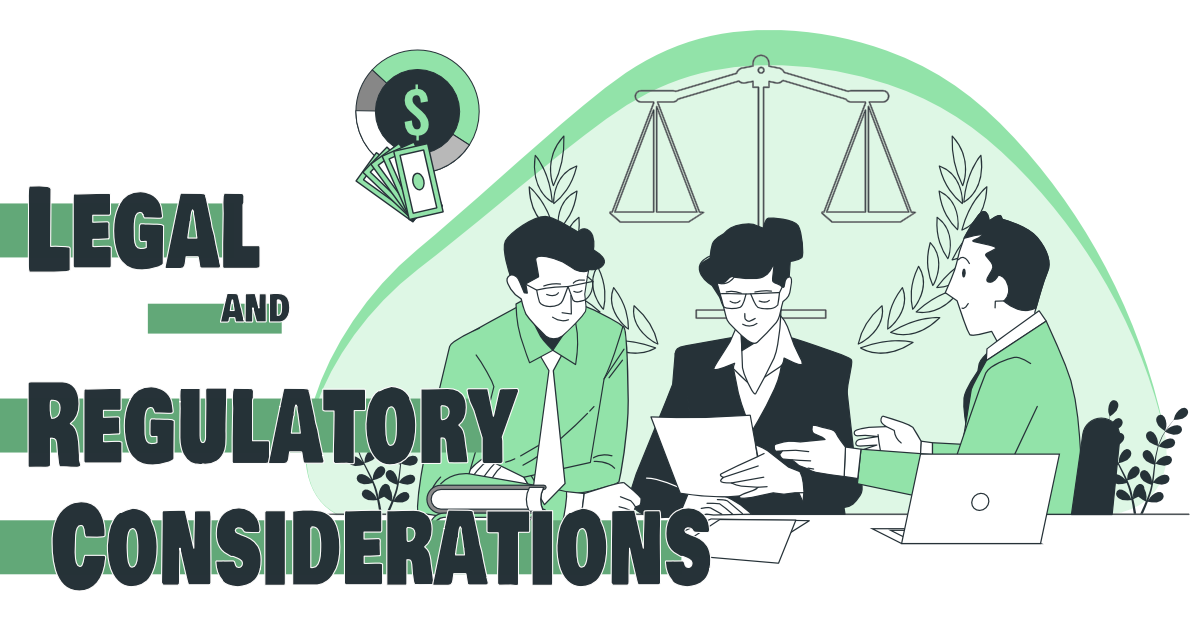When it comes to funding and financial management for entrepreneurs, there are a host of legal and regulatory considerations that must be taken into account. From understanding the different types of funding options available, to navigating the often-complex legal landscape surrounding financial management, it’s crucial for entrepreneurs to have a firm grasp on these considerations in order to make informed decisions and avoid potential pitfalls. In this series of articles, we will delve into the legal and regulatory considerations for funding and financial management, providing valuable insights and practical advice for entrepreneurs at every stage of their journey.”
Understanding corporate and business law
As an entrepreneur, understanding the legal and regulatory considerations surrounding funding and financial management is crucial. One area that is particularly important to be familiar with is corporate and business law. This can include everything from incorporating your business, to understanding your responsibilities as a corporate officer, to complying with securities laws.
Incorporation
When starting a business, one of the first legal decisions you will need to make is whether to incorporate your company or operate as a sole proprietor or partnership. Incorporating your business can provide a number of benefits, such as limited liability protection for the company’s owners (known as shareholders or stockholders) and the ability to raise capital through the sale of stock. However, incorporating also comes with a number of legal and regulatory requirements, such as holding annual meetings and keeping accurate corporate records.
Best Practice:
It is always best practice to consult with a lawyer or legal advisor when deciding whether to incorporate a business, as well as on the specific laws and regulations that apply in the jurisdiction where the business will operate.
Corporate Governance
Once a business is incorporated, there are a number of ongoing legal and regulatory responsibilities that must be met. One of the most important of these is corporate governance. Corporate governance refers to the system of rules, practices, and processes by which a corporation is directed and controlled. This can include everything from how the company is structured and how decisions are made, to how shareholders are involved in the company’s operations.
Best Practice:
To ensure compliance with corporate governance laws, it is important to have a clear set of corporate bylaws in place, and to hold regular meetings of the shareholders and board of directors. Additionally, it’s crucial to keep accurate and up-to-date records of all corporate transactions and activities.
Securities Laws
Another important area of corporate and business law that entrepreneurs need to be familiar with is securities laws. These laws govern the offer and sale of securities, such as stocks and bonds, to the public. This can include everything from registering securities with the Securities and Exchange Commission (SEC) to complying with disclosure and reporting requirements.
Best Practice:
To ensure compliance with securities laws, it’s important to consult with a lawyer or legal advisor who is familiar with these laws and regulations. Additionally, it’s a good idea to establish a set of internal policies and procedures for ensuring compliance with securities laws, and to regularly review and update these policies as necessary.
In conclusion, Corporate and Business law is a vital aspect for entrepreneurs, it plays a crucial role in funding and financial management. It’s important for entrepreneurs to have a firm grasp on these considerations in order to make informed decisions and avoid potential pitfalls. Entrepreneurs should always consult with a lawyer or legal advisor when making decisions related to corporate and business law, and to stay informed about changes in laws and regulations that may impact their business.
References
- Securities and Exchange Commission (SEC) https://www.sec.gov/
- Corporate Governance Institute https://www.corporategovernance.com/
- Small Business Administration (SBA) https://www.sba.gov/ “
Managing compliance with securities laws and regulations
As an entrepreneur, understanding and complying with securities laws and regulations is an essential aspect of funding and financial management. These laws and regulations govern the offer and sale of securities, such as stocks and bonds, to the public, and non-compliance can result in significant legal and financial consequences.
SEC Registration and Disclosure Requirements
The Securities and Exchange Commission (SEC) is the federal agency responsible for enforcing securities laws and regulations in the United States. One of the most important aspects of securities compliance for entrepreneurs is registering securities with the SEC and complying with the various disclosure and reporting requirements that come with this registration. This can include providing information about the company’s business and financial condition, as well as disclosing any potential risks or uncertainties to investors.
Best Practice:
To ensure compliance with SEC registration and disclosure requirements, it’s important to consult with a lawyer or legal advisor who is experienced in securities law. Additionally, it’s a good idea to establish a set of internal policies and procedures for ensuring compliance with these requirements, and to regularly review and update these policies as necessary.
Blue Sky Laws
In addition to SEC registration and disclosure requirements, entrepreneurs also need to be aware of state-level securities laws, often referred to as “blue sky laws.” These laws can vary significantly from state to state and may include additional registration and disclosure requirements, as well as restrictions on the sale of securities within a particular state.
Best Practice:
To ensure compliance with blue sky laws, it’s important to consult with a lawyer or legal advisor who is familiar with the securities laws and regulations in the states where the securities will be offered or sold. Additionally, it’s a good idea to establish a set of internal policies and procedures for ensuring compliance with these laws, and to regularly review and update these policies as necessary.
Insider Trading
Another important area of securities compliance for entrepreneurs is insider trading. Insider trading refers to the buying or selling of securities by individuals who have access to nonpublic information about a company. This can include company executives, directors, and other insiders. Insider trading is illegal and can result in significant legal and financial consequences.
Best Practice:
To ensure compliance with insider trading laws, it’s important to establish a set of internal policies and procedures for preventing insider trading, and to regularly review and update these policies as necessary. Additionally, it’s important for all employees and other insiders to receive training on insider trading laws and the company’s insider trading policies.
In conclusion, compliance with securities laws and regulations is crucial for entrepreneurs. It is essential to be aware of SEC registration and disclosure requirements, blue sky laws and insider trading laws. Entrepreneurs should always consult with a lawyer or legal advisor when making decisions related to securities compliance, and to stay informed about changes in laws and regulations that may impact their business.
References
- Securities and Exchange Commission (SEC) https://www.sec.gov/
- North American Securities Administrators Association (NASAA) https://www.nasaa.org/
- Insider Trading and Compliance https://www.insidercompliance.com/“
Managing intellectual property and trademark
As an entrepreneur, managing your company’s intellectual property and trademark is an essential aspect of funding and financial management. These assets can provide significant value to your business, and it’s important to take steps to protect them and prevent infringement by others.
Understanding Intellectual Property
Intellectual property refers to the creations of the mind, such as inventions, literary and artistic works, and symbols and designs. There are several different types of intellectual property, including patents, copyrights, trademarks, and trade secrets. Each type of intellectual property is protected by different laws and regulations, and it’s important to understand the differences between them and how they can be used to protect your company’s assets.
Best Practice:
To ensure that your company’s intellectual property is protected, it’s important to consult with a lawyer or legal advisor who is experienced in intellectual property law. Additionally, it’s a good idea to establish a set of internal policies and procedures for identifying, protecting, and managing your company’s intellectual property, and to regularly review and update these policies as necessary.
Trademarking Your Company’s Name and Logo
A trademark is a distinctive sign or indicator that is used to identify a particular company’s goods or services and to distinguish them from those of other companies. Trademarks can include words, logos, and other symbols, and they are protected by trademark law. By trademarking your company’s name and logo, you can prevent others from using them without your permission and can take legal action against those who do.
Best Practice:
To ensure that your company’s name and logo are properly trademarked, it’s important to consult with a lawyer or legal advisor who is experienced in trademark law. Additionally, it’s a good idea to conduct a thorough trademark search before choosing a company name or logo to ensure that it’s available for use, and to monitor your trademark for infringement by others.
Protecting Trade Secrets
A trade secret is any information that is not generally known and that gives a company a competitive advantage. Trade secrets can include anything from a secret recipe for a product to a proprietary manufacturing process. Trade secret laws can protect your company’s trade secrets from being disclosed or used by others without your permission.
Best Practice:
To protect your company’s trade secrets, it’s important to establish a set of internal policies and procedures for identifying and protecting trade secrets, and to regularly review and update these policies as necessary. Additionally, it’s important to ensure that all employees and other individuals who have access to trade secrets are aware of the company’s trade secret policies and sign non-disclosure agreements.
In conclusion, managing intellectual property and trademark is crucial for entrepreneurs. It is essential to be aware of the different types of intellectual property, trademarking company’s name and logo, and protecting trade secrets. Entrepreneurs should always consult with a lawyer or legal advisor when making decisions related to intellectual property and trademark, and to stay informed about changes in laws and regulations that may impact their business.
References
- World Intellectual Property Organization (WIPO) https://www.wipo.int/
- United States Patent and Trademark Office (USPTO) https://www.uspto.gov/
- International Trade Secrets Law https://www.internationallawoffice.com/Newsletters/Detail.aspx?g=a3a8a8a9-d6f1-4e9b-8cf8-15e14a0a2a2c “
Managing employment and labor laws
As an entrepreneur, managing your company’s compliance with employment and labor laws is an essential aspect of funding and financial management. These laws can have a significant impact on your business, and it’s important to take steps to ensure that you are in compliance and minimize potential liability.
Understanding Employment and Labor Laws
Employment and labor laws are a complex and ever-changing area of law that regulate the relationship between employers and employees. These laws cover a wide range of issues, including minimum wage, overtime pay, equal pay, discrimination, and workplace safety. It’s important to understand the laws that apply to your business and to stay informed about changes in laws and regulations that may impact your business.
Best Practice:
To ensure that your company is in compliance with employment and labor laws, it’s important to consult with a lawyer or legal advisor who is experienced in this area of law. Additionally, it’s a good idea to establish a set of internal policies and procedures for managing compliance with employment and labor laws, and to regularly review and update these policies as necessary.
Managing Discrimination and Harassment
Discrimination and harassment in the workplace is illegal and can have serious consequences for your business. It’s important to ensure that all employees understand your company’s policies against discrimination and harassment, and to create a culture of respect and inclusivity in the workplace.
Best Practice:
To prevent discrimination and harassment in the workplace, it’s important to establish a set of internal policies and procedures for addressing these issues, and to train all employees on these policies and their responsibilities. Additionally, it’s important to create a reporting system that allows employees to report incidents of discrimination and harassment, and to ensure that all reports are investigated promptly and fairly.
Managing Employee Leave
Employee leave laws can be complex and confusing, and it’s important to ensure that your company is in compliance with these laws. These laws typically cover issues such as vacation time, sick leave, family and medical leave, and pregnancy leave.
Best Practice:
To ensure that your company is in compliance with employee leave laws, it’s important to consult with a lawyer or legal advisor who is experienced in this area of law. Additionally, it’s a good idea to establish a set of internal policies and procedures for managing employee leave, and to regularly review and update these policies as necessary.
In conclusion, managing employment and labor laws is crucial for entrepreneurs. It is essential to be aware of the different laws and regulations, managing discrimination and harassment, and managing employee leave laws. Entrepreneurs should always consult with a lawyer or legal advisor when making decisions related to employment and labor laws, and to stay informed about changes in laws and regulations that may impact their business.
References
- The United States Department of Labor (DOL) https://www.dol.gov/
- The Equal Employment Opportunity Commission (EEOC) https://www.eeoc.gov/
- The National Labor Relations Board (NLRB) https://www.nlrb.gov/ “
Managing consumer protection and privacy laws
As an entrepreneur, it is essential to understand and comply with consumer protection and privacy laws to protect your business and customers. These laws can have a significant impact on your business operations, and it’s important to take steps to ensure that you are in compliance and minimize potential liability.
Understanding Consumer Protection Laws
Consumer protection laws are in place to protect consumers from unfair or deceptive business practices. These laws cover a wide range of issues, including advertising, marketing, and product safety. It’s important to understand the laws that apply to your business and to stay informed about changes in laws and regulations that may impact your business.
Best Practice:
To ensure that your company is in compliance with consumer protection laws, it’s important to consult with a lawyer or legal advisor who is experienced in this area of law. Additionally, it’s a good idea to establish a set of internal policies and procedures for managing compliance with consumer protection laws, and to regularly review and update these policies as necessary.
Managing Privacy Laws
Privacy laws are in place to protect consumers’ personal information and data, and it’s important to ensure that your company is in compliance with these laws. These laws can be complex, and it’s important to understand the different laws that apply to your business and to stay informed about changes in laws and regulations that may impact your business.
Best Practice:
To ensure that your company is in compliance with privacy laws, it’s important to consult with a lawyer or legal advisor who is experienced in this area of law. Additionally, it’s a good idea to establish a set of internal policies and procedures for managing consumer privacy, and to regularly review and update these policies as necessary.
Managing Online Consumer Protection
In today’s digital age, it is crucial for entrepreneurs to ensure that their online business practices are compliant with consumer protection laws. This includes ensuring that online advertisements and marketing materials are accurate and truthful, and that online transactions are secure and consumers’ personal information is protected.
Best Practice:
To ensure that your company is in compliance with online consumer protection laws, it’s important to consult with a lawyer or legal advisor who is experienced in this area of law. Additionally, it’s a good idea to establish a set of internal policies and procedures for managing online consumer protection, and to regularly review and update these policies as necessary.
In conclusion, managing consumer protection and privacy laws is crucial for entrepreneurs. It is essential to be aware of the different laws and regulations, managing privacy laws, and managing online consumer protection laws. Entrepreneurs should always consult with a lawyer or legal advisor when making decisions related to consumer protection and privacy laws, and to stay informed about changes in laws and regulations that may impact their business.
References
- Federal Trade Commission (FTC) https://www.ftc.gov/
- Office of the Privacy Commissioner of Canada (OPC) https://www.priv.gc.ca/
- The California Consumer Privacy Act (CCPA) https://oag.ca.gov/privacy/ccpa“
Managing antitrust and competition laws
As an entrepreneur, it is essential to understand and comply with antitrust and competition laws to protect your business and customers. These laws can have a significant impact on your business operations, and it’s important to take steps to ensure that you are in compliance and minimize potential liability.
Understanding Antitrust Laws
Antitrust laws are in place to protect consumers from anti-competitive business practices, such as price fixing, bid rigging, and monopolies. These laws are designed to promote fair competition and ensure that consumers have access to a variety of products and services at competitive prices. It’s important to understand the laws that apply to your business and to stay informed about changes in laws and regulations that may impact your business.
Best Practice:
To ensure that your company is in compliance with antitrust laws, it’s important to consult with a lawyer or legal advisor who is experienced in this area of law. Additionally, it’s a good idea to establish a set of internal policies and procedures for managing compliance with antitrust laws, and to regularly review and update these policies as necessary.
Managing Competition Laws
Competition laws are in place to protect consumers by ensuring fair and open competition in the marketplace. These laws can be complex, and it’s important to understand the different laws that apply to your business and to stay informed about changes in laws and regulations that may impact your business.
Best Practice:
To ensure that your company is in compliance with competition laws, it’s important to consult with a lawyer or legal advisor who is experienced in this area of law. Additionally, it’s a good idea to establish a set of internal policies and procedures for managing competition compliance, and to regularly review and update these policies as necessary.
Managing Mergers and Acquisitions
When it comes to mergers and acquisitions, antitrust and competition laws play a critical role. These laws are in place to ensure that mergers and acquisitions don’t lead to anti-competitive business practices, such as monopolies.
Best Practice:
To ensure that your company is in compliance with antitrust and competition laws related to mergers and acquisitions, it’s important to consult with a lawyer or legal advisor who is experienced in this area of law. Additionally, it’s a good idea to establish a set of internal policies and procedures for managing compliance with antitrust and competition laws related to mergers and acquisitions, and to regularly review and update these policies as necessary.
In conclusion, managing antitrust and competition laws is crucial for entrepreneurs. It is essential to be aware of the different laws and regulations, managing competition laws, and managing mergers and acquisitions laws. Entrepreneurs should always consult with a lawyer or legal advisor when making decisions related to antitrust and competition laws, and to stay informed about changes in laws and regulations that may impact their business.
References:
- Federal Trade Commission (FTC) https://www.ftc.gov/
- Competition Bureau Canada https://www.competitionbureau.gc.ca/
- European Commission – Competition https://ec.europa.eu/competition/index_en.html“
Managing tax laws and regulations
As an entrepreneur, it is essential to understand and comply with tax laws and regulations to protect your business and ensure its financial success. Failure to comply with tax laws can result in significant fines and penalties, and can even put your business at risk.
Understanding Tax Laws and Regulations
Tax laws and regulations can be complex and vary depending on the jurisdiction in which your business operates. It’s important to understand the laws that apply to your business, including federal, state, and local tax laws. You should also stay informed about changes in laws and regulations that may impact your business.
Best Practice:
To ensure that your company is in compliance with tax laws and regulations, it’s important to consult with a tax professional or accountant who is experienced in this area. Additionally, it’s a good idea to establish a set of internal policies and procedures for managing compliance with tax laws and regulations, and to regularly review and update these policies as necessary.
Managing Tax Planning and Compliance
Proper tax planning can help you minimize your tax liability and maximize your business’s financial success. This includes taking advantage of tax deductions and credits that are available to your business, and ensuring that you are in compliance with all tax laws and regulations.
Best Practice:
To ensure that your company is in compliance with tax laws and regulations, it’s important to consult with a tax professional or accountant who is experienced in this area. Additionally, it’s a good idea to establish a set of internal policies and procedures for managing tax planning and compliance, and to regularly review and update these policies as necessary.
Managing Sales Tax and Use Tax
Sales tax and use tax are taxes that are imposed on the sale or use of goods and services. It’s important to understand the laws that apply to your business, including federal, state, and local sales and use tax laws.
Best Practice:
To ensure that your company is in compliance with sales tax and use tax laws, it’s important to consult with a tax professional or accountant who is experienced in this area. Additionally, it’s a good idea to establish a set of internal policies and procedures for managing sales tax and use tax compliance, and to regularly review and update these policies as necessary.
In conclusion, managing tax laws and regulations is crucial for entrepreneurs. It is essential to be aware of the different laws and regulations, managing tax planning and compliance, and managing sales tax and use tax. Entrepreneurs should always consult with a tax professional or accountant when making decisions related to tax laws and regulations, and stay informed about changes in laws and regulations that may impact their business.
References
- Internal Revenue Service (IRS) https://www.irs.gov/
- State Tax Agencies https://www.taxadmin.org/state-tax-agencies
- European Union – Taxation and Customs Union https://ec.europa.eu/taxation_customs/home_en“
Managing contract and negotiation laws
As an entrepreneur, understanding and navigating the legal and regulatory considerations surrounding contracts and negotiations is crucial to the success of your business. From drafting and signing contracts to negotiating deals, it’s important to understand the laws and regulations that govern these processes to protect your interests and avoid potential legal disputes.
Understanding Contract Laws
- Contract laws set the rules and guidelines for the formation, enforcement, and interpretation of contracts.
- It’s important for entrepreneurs to understand the basic elements of a contract, including offer, acceptance, consideration, and legality.
- Entrepreneurs should also be familiar with common types of contracts, such as employment contracts, service contracts, and purchase agreements.
Drafting Effective Contracts
- A well-drafted contract can help protect the interests of both parties and prevent disputes.
- Entrepreneurs should work with an attorney to ensure that contracts are clear, concise, and include all necessary terms and conditions.
- It’s also important to include clauses for dispute resolution and termination.
Negotiating Contracts
- Effective negotiation is key to successful contracting.
- Entrepreneurs should be familiar with common negotiation tactics and strategies, such as the use of deadlines and the “BATNA” (best alternative to a negotiated agreement) concept.
- It’s also important to understand the legal limits on negotiation, such as laws against fraud and misrepresentation.
Enforcing Contracts
- Entrepreneurs should be aware of the legal options available for enforcing contracts, such as mediation, arbitration, and litigation.
- It’s also important to understand the remedies available in the event of a breach of contract, such as monetary damages and specific performance.
Navigating contract and negotiation laws can be challenging for entrepreneurs, but understanding the basics of contract formation, drafting, negotiation, and enforcement can help protect your interests and avoid potential legal disputes. It’s always best practice to consult with an attorney to ensure your contracts and negotiations are in compliance with the laws and regulations.
References
- “The Entrepreneur’s Guide to Business Law” by Constance E. Bagley and Craig E. Dauchy
- “Negotiating for Dummies” by Michael C. Donaldson and David Meerman Scott
- “The Contract Negotiation Handbook” by Ed Brodow
- “The Contracts Deskbook for Paralegals” by Deborah E. Bouchoux
Managing import and export laws
As an entrepreneur, understanding and complying with the legal and regulatory considerations surrounding imports and exports is crucial to the success of your business. Whether you’re importing raw materials or exporting finished products, it’s important to understand the laws and regulations that govern these processes to ensure compliance and avoid potential legal issues.
Understanding Import Laws
- Import laws regulate the bringing of goods into a country, including tariffs, quotas, and other trade restrictions.
- Entrepreneurs should be familiar with the laws and regulations related to specific products, such as food safety laws and environmental regulations.
- It’s also important to understand the process for obtaining necessary licenses and permits for importing goods.
Understanding Export Laws
- Export laws regulate the sending of goods out of a country, including export controls and sanctions.
- Entrepreneurs should be familiar with the laws and regulations related to specific products, such as arms export controls and dual-use goods regulations.
- It’s also important to understand the process for obtaining necessary licenses and permits for exporting goods.
Best Practices for Import and Export Compliance
- Entrepreneurs should establish compliance policies and procedures to ensure that they are adhering to all import and export laws and regulations.
- It’s also important to conduct due diligence on suppliers, customers, and business partners to ensure compliance with import and export laws.
- Entrepreneurs should also stay up to date on any changes in import and export laws and regulations.
Consequences of non-compliance
- Failure to comply with import and export laws can result in penalties, fines, and even criminal charges.
- Entrepreneurs should be aware of the potential consequences of non-compliance, including seizure of goods, revocation of licenses and permits, and blacklisting from future import and export activities.
Navigating import and export laws can be challenging for entrepreneurs, but understanding the basics of import and export regulations, compliance best practices, and the potential consequences of non-compliance can help ensure compliance and avoid potential legal issues. It’s always best practice to consult with an attorney or trade compliance professional to ensure your import and export activities are in compliance with the laws and regulations.
References
- “International Business: The Challenges of Globalization” by John J. Wild and Kenneth L. Wild
- “Import/Export: How to Get Started in International Trade” by Carl A. Nelson
- “A Basic Guide to Exporting” by U.S. Department of Commerce
- “Import and Export Compliance: A Guide for Businesses” by Michael J. Scutella and Janet L. Wilson.
Managing environmental and sustainability laws
As an entrepreneur, it is important to not only focus on the financial success of your business, but also to consider the impact it has on the environment and society. Environmental and sustainability laws play a crucial role in regulating a business’s actions and ensuring they are in line with societal and ecological standards. In this article, we will explore the key laws and regulations that entrepreneurs should be aware of in order to successfully navigate this complex area of law.
The Clean Air Act and Clean Water Act
The Clean Air Act and Clean Water Act are two of the most important federal environmental laws in the United States. They regulate the emission of pollutants into the air and water, respectively, and set standards for the quality of the nation’s air and water. Entrepreneurs should ensure that their operations are in compliance with these laws and work to reduce their environmental impact where possible.
The Resource Conservation and Recovery Act
The Resource Conservation and Recovery Act (RCRA) regulates the management of hazardous waste. Entrepreneurs should be aware of the types of waste their business generates, how it is stored and transported, and how it is disposed of. They should also be familiar with the regulations for each type of waste and ensure that their business is in compliance.
The National Environmental Policy Act
The National Environmental Policy Act (NEPA) requires federal agencies to consider the environmental impact of their actions. Entrepreneurs who are looking to expand their operations or enter into contracts with federal agencies should be aware of this law and the potential impact it may have on their business.
The Sustainable Development Goals
The United Nations has established 17 Sustainable Development Goals (SDGs) to guide global development efforts. These goals include targets such as no poverty, zero hunger, and clean water and sanitation. Entrepreneurs should consider how their business aligns with these goals and work to make a positive impact in these areas.
Best Practices for Environmental and Sustainability Compliance
- Conduct regular audits of your operations to identify areas where improvements can be made
- Implement an environmental management system to help manage compliance with laws and regulations
- Develop a sustainability plan that outlines your business’s environmental and social impact and sets goals for improvement
- Stay informed about new laws and regulations that may impact your business
References
- Clean Air Act, 42 U.S.C. 7401 et seq.
- Clean Water Act, 33 U.S.C. 1251 et seq.
- Resource Conservation and Recovery Act, 42 U.S.C. 6901 et seq.
- National Environmental Policy Act, 42 U.S.C. 4321 et seq.
- United Nations Sustainable Development Goals: https://www.un.org/sustainabledevelopment/sustainable-development-goals/
Managing compliance with environmental and sustainability laws can seem overwhelming, but it is an essential aspect of being a responsible entrepreneur. By staying informed and taking proactive steps to reduce your business’s environmental impact, you can not only comply with the law, but also contribute to a more sustainable future. Subscription to our platform can help entrepreneurs stay informed and compliant with all the laws and regulations.
Managing foreign investment and international trade laws
As an entrepreneur, you may be looking to expand your business globally or seek foreign investment. However, international trade and foreign investment come with their own set of laws and regulations that must be adhered to. Failure to comply with these laws can result in fines, penalties, and even criminal charges. In this article, we will discuss some of the key laws and regulations that entrepreneurs need to be aware of when engaging in foreign investment or international trade.
Foreign Investment Review Laws
Foreign investment review laws are put in place to ensure that foreign investment does not pose a threat to national security or public policy. The Committee on Foreign Investment in the United States (CFIUS) is an inter-agency committee that reviews foreign investments for potential national security concerns. Entrepreneurs seeking foreign investment should be aware of CFIUS and the review process to ensure compliance.
Export Control Laws
Export control laws regulate the export of goods, services, and technologies to ensure compliance with national security and foreign policy objectives. The Bureau of Industry and Security (BIS) administers export control laws, and entrepreneurs should be aware of the licensing requirements and regulations when exporting goods or services.
Sanctions and Embargoes
Sanctions and embargoes are economic measures put in place by governments to restrict trade and investment with specific countries or entities. Entrepreneurs engaging in international trade should be aware of any sanctions and embargoes that may apply to their business and ensure compliance to avoid penalties.
Anti-Bribery and Corruption Laws
Anti-bribery and corruption laws, such as the Foreign Corrupt Practices Act (FCPA) in the United States, prohibit the bribery of foreign officials for business purposes. Entrepreneurs should be aware of these laws and implement compliance measures to ensure they are not engaging in any illegal activities.
Intellectual Property Protection
Intellectual property laws vary by country, and entrepreneurs should be aware of the laws in the countries where they are doing business. This includes obtaining patents, trademarks, and copyrights in those countries to protect their intellectual property.
References:
- Committee on Foreign Investment in the United States (CFIUS) – https://www.treasury.gov/resource-center/international/foreign-investment/Pages/cfius.aspx
- Bureau of Industry and Security (BIS) – https://www.bis.doc.gov/index.php/policy-guidance/deemed-exports
- Foreign Corrupt Practices Act (FCPA) – https://www.justice.gov/criminal-fraud/foreign-corrupt-practices-act
- World Intellectual Property Organization (WIPO) – https://www.wipo.int/about-ip/en/
Navigating the laws and regulations related to foreign investment and international trade can be complex and time-consuming. However, being aware of these laws and taking the necessary steps to ensure compliance is essential for entrepreneurs looking to expand their business globally. Entrepreneurs should consult with legal professionals and trade experts to ensure compliance and to take advantage of opportunities for international growth.
Managing banking and financial laws and regulations
Entrepreneurs who are seeking funding or managing finances for their business must navigate a complex web of banking and financial laws and regulations. These regulations are put in place to protect consumers and investors, but they can also be a source of confusion and frustration for entrepreneurs. In this article, we will explore some of the key banking and financial laws and regulations that entrepreneurs should be aware of, and provide best practices and examples for navigating these regulations successfully.
Understanding the Regulatory Framework for Banks and Financial Institutions
The first step in managing banking and financial laws and regulations is to understand the regulatory framework in which banks and financial institutions operate. In the United States, this framework is primarily composed of federal laws and regulations, such as the Bank Holding Company Act and the Dodd-Frank Wall Street Reform and Consumer Protection Act. These laws and regulations establish the rules and oversight for banks and financial institutions, and entrepreneurs should be familiar with them in order to work effectively with these institutions.
Navigating the Lending and Credit Process
Another key area of banking and financial laws and regulations that entrepreneurs should be familiar with is the lending and credit process. This includes understanding the rules for lending, such as the Truth in Lending Act and the Equal Credit Opportunity Act, as well as the rules for credit reporting, such as the Fair Credit Reporting Act. Entrepreneurs should also be aware of the rules for managing debt and credit, such as the Fair Debt Collection Practices Act and the Credit Repair Organizations Act.
Managing Risk and Compliance
In addition to understanding the rules for lending and credit, entrepreneurs must also be aware of the regulations related to risk and compliance. This includes laws and regulations related to anti-money laundering, know-your-customer requirements, and the Bank Secrecy Act. Entrepreneurs should work closely with their banking and financial partners to ensure that they are in compliance with these regulations, and should have systems in place to detect and report any suspicious activity.
Best Practices for Entrepreneurs
- Entrepreneurs can take several steps to effectively manage banking and financial laws and regulations:
- Stay informed about changes in laws and regulations by subscribing to industry newsletters and attending relevant conferences.
- Work closely with your banking and financial partners to ensure that you are in compliance with all relevant regulations.
- Have systems in place to detect and report suspicious activity, such as money laundering or fraud.
- Develop a risk management plan and review it regularly to ensure that you are prepared for any potential compliance issues.
- Seek legal and financial advice when needed, such as hiring a lawyer or financial advisor.
References
- Bank Holding Company Act
- Dodd-Frank Wall Street Reform and Consumer Protection Act
- Truth in Lending Act
- Equal Credit Opportunity Act
- Fair Credit Reporting Act
- Fair Debt Collection Practices Act
- Credit Repair Organizations Act
- Anti-Money Laundering
- Know-Your-Customer requirements
- Bank Secrecy Act
Entrepreneurs who are seeking funding or managing finances for their business must navigate a complex web of banking and financial laws and regulations. By understanding the regulatory framework, navigating the lending and credit process, managing risk and compliance, and implementing best practices, entrepreneurs can effectively manage these regulations and protect their business.
Managing cyber-security laws and regulations
As technology continues to advance, the importance of cyber-security in the business world cannot be overstated. With the increasing reliance on digital systems and the internet, the risk of cyber-attacks and data breaches is at an all-time high. As an entrepreneur, it is crucial to understand the legal and regulatory considerations surrounding cyber-security to protect your business and customers.
Understanding the Laws and Regulations
In order to properly manage cyber-security, it is important to understand the laws and regulations that apply to your business. These laws vary by country and industry, but some examples include the General Data Protection Regulation (GDPR) in the European Union and the Cybersecurity Information Sharing Act (CISA) in the United States. It is important to consult with legal counsel to ensure compliance with all relevant laws and regulations.
Best Practices for Cyber-Security
In addition to understanding the laws and regulations, there are several best practices that can help to protect your business from cyber-attacks. These include:
- Implementing strong passwords and two-factor authentication
- Regularly updating software and systems
- Conducting regular security audits and risk assessments
- Providing cyber-security training for employees
- Having a incident response plan in place in case of a data breach
Managing Third-Party Vendors
In today’s digital age, many businesses rely on third-party vendors for services such as cloud storage, payment processing, and data analysis. It is important to ensure that these vendors have robust cyber-security measures in place and to regularly review and update vendor contracts to include language around cyber-security responsibilities.
Protecting Customer Data
In the event of a data breach, it is important to take steps to protect the data of your customers. This includes notifying affected customers in a timely manner, providing credit monitoring services, and implementing additional security measures to prevent future breaches.
References
- General Data Protection Regulation (GDPR)
- Cybersecurity Information Sharing Act (CISA)
- National Institute of Standards and Technology (NIST) Cybersecurity Framework
- OWASP Top 10 Project for web application security
- International Association of Privacy Professionals (IAPP)
As an entrepreneur, it is crucial to understand and manage the legal and regulatory considerations surrounding cyber-security. By implementing best practices and working with legal counsel, you can protect your business and customers from the ever-present threat of cyber-attacks.
Understanding the role of legal representation and legal resources for entrepreneurs
When starting and scaling a business, entrepreneurs must navigate a complex landscape of laws and regulations. While it may be tempting to handle legal matters on your own, having the right legal representation and access to the right resources can make all the difference in protecting your business interests and achieving long-term success.
The Importance of Legal Representation
- Legal representation can provide expert guidance and advice on a wide range of legal matters, including contract negotiations, employment law, intellectual property, and more.
- An experienced attorney can help you identify potential legal risks and develop strategies to mitigate them.
- Legal representation can also help you navigate the legal system, including filing paperwork and representing you in court.
Finding the Right Legal Representation
- When selecting a lawyer or law firm, it’s important to consider factors such as the attorney’s experience, specializations, and reputation.
- Entrepreneurs should also consider the cost of legal representation, including hourly rates and retainer fees.
- Networking and asking for referrals can be helpful in finding the right legal representation for your business.
Legal Resources for Entrepreneurs
- In addition to legal representation, entrepreneurs can also benefit from access to legal resources such as templates and sample agreements, legal research databases, and online legal information.
- Government websites and small business organizations may offer helpful information and resources related to laws and regulations.
- Legaltech startups also offer online resources that can be helpful in dealing with legal compliance.
References
- American Bar Association, “Choosing and Working with a Lawyer”, https://www.americanbar.org/groups/public_education/resources/law_issues_for_consumers/choosing_and_working_with_a_lawyer/
- Small Business Administration, “Legal Structures”, https://www.sba.gov/business-guide/launch-your-business/choose-business-structure
- National Small Business Association, “Legal Resources for Small Business Owners”, https://www.nsba.biz/advocacy/small-business-resources/legal-resources-for-small-business-owners/
- Legaltech startups like LegalZoom, Rocket Lawyer, and UpCounsel.
Having the right legal representation and access to legal resources can be critical for entrepreneurs looking to start and scale a business. By understanding the importance of legal representation and identifying the right attorney or law firm, entrepreneurs can take steps to protect their business interests and achieve long-term success.
Managing Legal Risk and legal disputes
As an entrepreneur, it’s important to understand the legal risks and potential disputes that may arise in the course of running your business. From contract disputes to intellectual property infringement, there are a variety of legal issues that can impact your business’s financial and operational success. In this article, we will explore best practices and strategies for managing legal risk and resolving legal disputes as an entrepreneur.
Identify and Assess Legal Risks
The first step in managing legal risk is to identify and assess potential legal issues that may arise in your business. This may include reviewing contracts, assessing potential intellectual property infringement, and evaluating compliance with relevant laws and regulations. By identifying potential legal risks early on, you can take proactive steps to mitigate or avoid them.
Develop a Legal Risk Management Plan
Once you have identified potential legal risks, it’s important to develop a legal risk management plan. This may include strategies for avoiding legal disputes, such as implementing strong contract review processes or establishing policies and procedures for protecting intellectual property. It may also include measures for mitigating legal risks, such as purchasing insurance or establishing a legal budget.
Utilize Legal Resources
Entrepreneurs have a variety of legal resources available to them, including attorneys, legal clinics, and online legal resources. It’s important to understand the legal resources available to you and when to utilize them. For example, an attorney may be necessary to review contracts or navigate complex legal disputes, while online legal resources may be useful for researching specific laws and regulations.
Negotiate and Mediate
Negotiating and mediating disputes can be a cost-effective and efficient way to resolve legal disputes. In many cases, disputes can be resolved through negotiation or mediation without the need for costly and time-consuming litigation.
Litigate as a Last Resort
While negotiation and mediation are preferred methods, sometimes litigation is necessary to resolve legal disputes. It’s important to have a clear understanding of the litigation process and the potential costs and risks involved.
References
- Small Business Administration. (n.d.). Legal Issues. Retrieved from https://www.sba.gov/starting-business/get-licenses-permits/legal-issues
- National Small Business Association. (n.d.). Legal Issues and Small Business. Retrieved from https://www.nsba.biz/advocacy/small-business-issues/legal-issues-and-small-business/
- U.S. Chamber of Commerce. (n.d.). Legal Resources for Small Businesses. Retrieved from https://www.uschamber.com/co/run/small-business-resources/legal-resources
Legal risk and disputes are an inevitable part of running a business. By understanding legal risks, developing a legal risk management plan, utilizing legal resources, negotiating and mediating disputes, and litigating as a last resort, entrepreneurs can effectively manage legal risk and resolve disputes.













